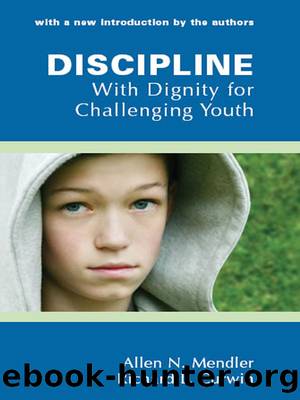Discipline With Dignity for Challenging Youth by Richard Curwin

Author:Richard Curwin
Language: eng
Format: epub
Publisher: Solution Tree Press
Published: 2011-08-15T00:00:00+00:00
In-and Out-of-School Factors
In addition to addressing basic needs, long-term strategies should also consider the in-school and out-of-school factors that affect behavior. For example, many students experience overwhelming stress in their lives. This stress can significantly affect their behavior and academic achievement. As educators, we must have the courage to help our students handle their stressful lives even when the strategies for doing so may be unpopular with our peers. A number of teachers at our workshops have quietly, almost secretly, shared the fact that they have found relaxation techniques, such as guided visualization, to be very effective in helping a child relax and in promoting a calmer classroom that is more conducive to learning.
A 5-year study reported in The Journal of Criminal Justice (Bleick & Abrams, 1987) investigated the effects of using meditation in a maximum-security prison. Inmates who learned a meditation technique experienced significant reductions in stress, aggression, and mental disorders. Violence in the prison decreased, and the rate of return among participating inmates was 30â35% less than for four other treatment groups. Similar studies have noted equally impressive results. Rozman (1994) has argued that many hyperactive children are so sensitive that they simply cannot handle the huge number of stimuli constantly bombarding and overwhelming them. She has discovered that the practice of meditation helps them concentrate, focus their sensitivities, and reduce their hyperactivity.
Although we do not regularly practice meditation techniques or specifically endorse them, schools should be unapologetic when they do things designed to change the person within so that he or she will be more peaceful, productive, and successful. A 1993 American Psychological Association report on violence concluded that school programs that teach social and emotional skills like managing anger, negotiating, adopting another childâs perspective, and thinking of alternative solutions to disagreements were particularly effective in reducing violence. These are all long-term programs that require repeated presentations, practice, and curriculum time in order to work. The positive results of these programs, however, are also likely to be more lasting.
The most important long-term discipline strategy is for students to learn how to be responsible and to make responsible choices on their own. Self-discipline is the most important trait to develop within a child. The best tools for developing responsibility are using limits, offering choices, and providing consequences.
Download
This site does not store any files on its server. We only index and link to content provided by other sites. Please contact the content providers to delete copyright contents if any and email us, we'll remove relevant links or contents immediately.
| Administration | Assessment |
| Educational Psychology | Experimental Methods |
| History | Language Experience Approach |
| Philosophy & Social Aspects | Reform & Policy |
| Research |
The Art of Coaching Workbook by Elena Aguilar(51198)
Trainspotting by Irvine Welsh(21662)
Twilight of the Idols With the Antichrist and Ecce Homo by Friedrich Nietzsche(18632)
Fangirl by Rainbow Rowell(9247)
Periodization Training for Sports by Tudor Bompa(8271)
Change Your Questions, Change Your Life by Marilee Adams(7780)
This Is How You Lose Her by Junot Diaz(6885)
Asking the Right Questions: A Guide to Critical Thinking by M. Neil Browne & Stuart M. Keeley(5772)
Grit by Angela Duckworth(5614)
Red Sparrow by Jason Matthews(5471)
Paper Towns by Green John(5188)
Room 212 by Kate Stewart(5119)
Ken Follett - World without end by Ken Follett(4731)
Housekeeping by Marilynne Robinson(4445)
The Sports Rules Book by Human Kinetics(4385)
Papillon (English) by Henri Charrière(4274)
Double Down (Diary of a Wimpy Kid Book 11) by Jeff Kinney(4268)
The Motorcycle Diaries by Ernesto Che Guevara(4098)
Exercise Technique Manual for Resistance Training by National Strength & Conditioning Association(4071)
